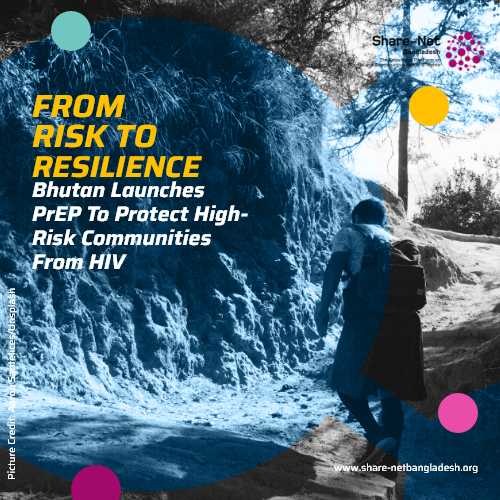From Risk to Resilience: Bhutan Launches PrEP to Protect High-Risk Communities From HIV
In a bold step to strengthen its fight against HIV/AIDS, Bhutan has rolled out Pre-Exposure Prophylaxis (PrEP) – a daily oral medication proven to significantly lower the risk of contracting HIV. Launched in December 2024, the programme targets people at high risk, especially men who have sex with men (MSM), female sex workers, and transgender individuals.
This critical move is the result of a collaboration between Bhutan’s Ministry of Health and Save the Children, with support from the Global Fund Project. As of now, 54 individuals in Thimphu and Paro have started taking PrEP under the pilot phase. Health officials believe this initiative could play a key role in achieving the national goal of a 90% reduction in new HIV infections by 2030.
Why PrEP Matters for SRHR
PrEP is designed for HIV-negative individuals who are at substantial risk of infection. Health experts recommend the drug for those with HIV-positive partners, people with a recent history of sexually transmitted infections (STIs), or individuals who share injection equipment. “PrEP is not just another pill; it’s a game-changer that gives control and protection to the people who need it the most,” said one health official involved in the rollout.
The initiative ties closely with broader Sexual and Reproductive Health and Rights (SRHR) issues, especially in protecting vulnerable groups from HIV and STIs. Bhutan has reported 1,010 HIV cases since the virus was first detected in 1993. Today, 772 people are living with HIV in the country.
With stigma still present in many communities, targeted prevention strategies like PrEP offer a discreet and empowering alternative to traditional tools like condoms. “This is about choice, safety, and dignity. Everyone deserves access to tools that protect their health and rights,” another official added.
Not a Silver Bullet, but a Strong Shield
While PrEP is highly effective in preventing HIV, it does not protect against other STIs like gonorrhoea or syphilis. Acknowledging this, Bhutan’s health ministry is pairing PrEP with other essential services—such as condom distribution, counseling, and regular health checkups. This integrated approach is key to ensuring comprehensive sexual health.
Such preventive efforts are crucial in a region where access to SRHR services is often limited by social stigma, geographic challenges, and lack of awareness. By rolling out PrEP with proper education and support, Bhutan is setting an example for other South Asian nations.
Looking Ahead
Bhutan’s PrEP rollout isn’t just a medical intervention—it’s a statement about equity, access, and the right to health. By focusing on key populations who are most at risk but often overlooked, the programme recognises that public health must include everyone.
With continued funding, political will, and community engagement, PrEP can transform the fight against HIV in Bhutan—and offer lessons for neighboring countries striving to meet their own SRHR goals.
Source Contributor: Jigmi Wangdi/Kuensel
Source: Asia News Network
Picture Credit:


